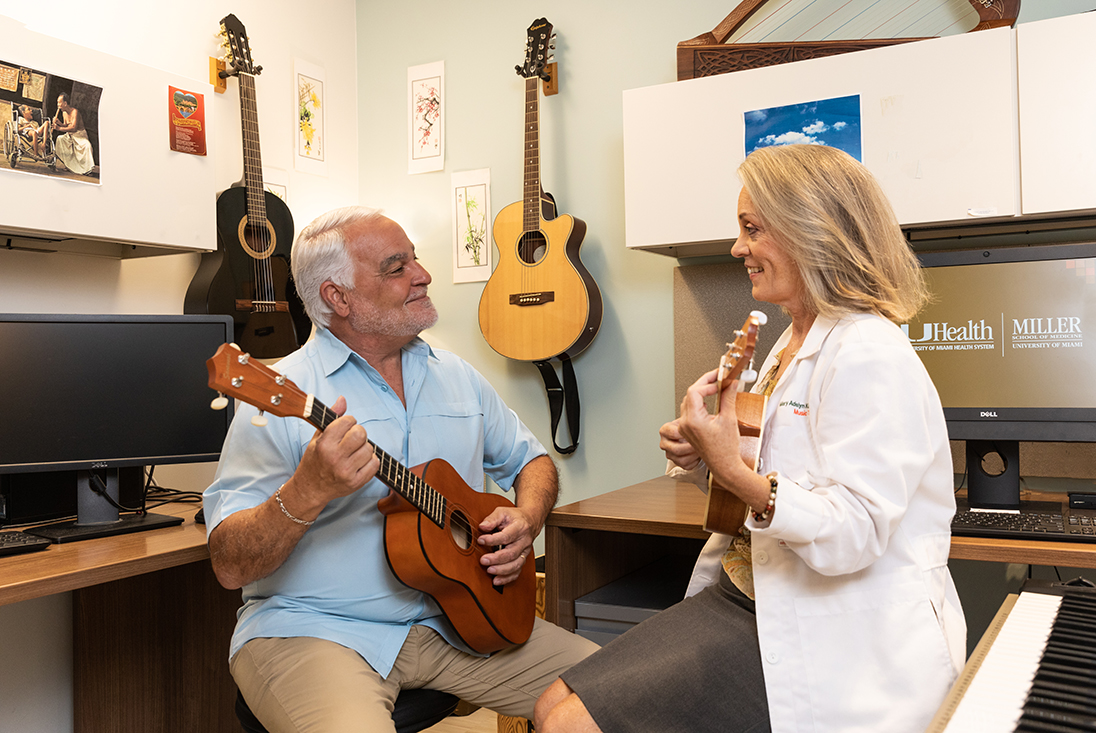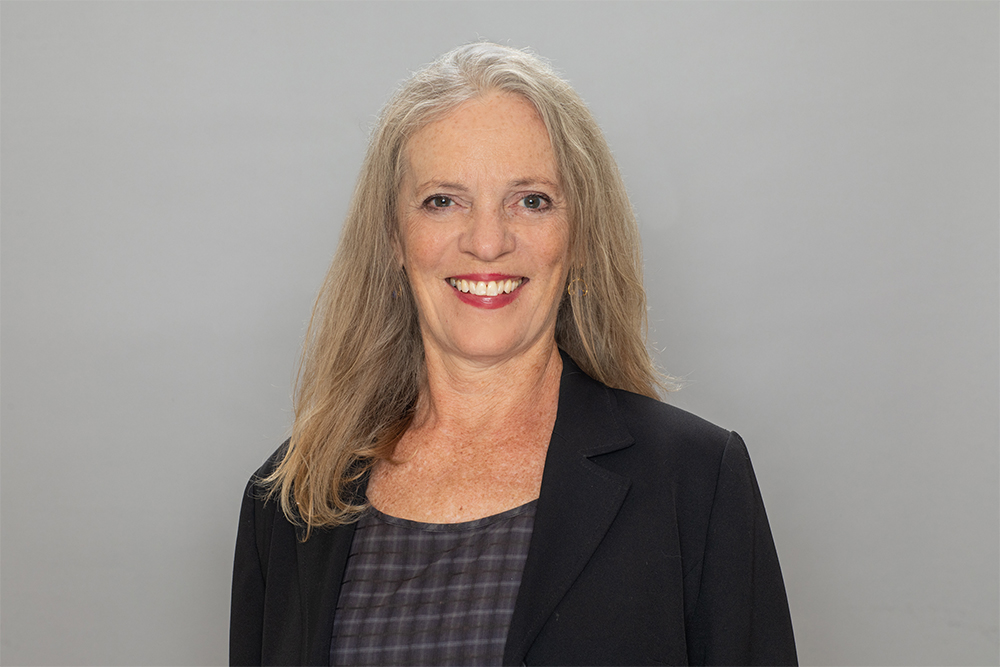Tapping into a world of rhythm, harmony, and community.
By Cara Tremols

Music has many roles for us. It can be a source of inspiration, creativity, and connection, and it can also heal us.
Mary Adelyn Kauffman, DMA, MT-BC, NMT, is a music therapist at Sylvester Comprehensive Cancer Center and a musician-by-training. Her interest in music led her to Sylvester, and her personal experience as a cancer survivor made her more interested in learning how music therapy could help others.
“I always had a very large interest in the effect that music has on people,” Dr. Kauffman said. “My immediate background was in choral conducting, and I always noticed that people left the rehearsal in a far better mood than when they entered it. I was very interested in the science behind that.”
Music therapy uses individualized, clinical and research evidence-based music interventions in a therapeutic relationship aimed at addressing non-musical needs, concerns, and goals.
“Music therapy, like any type of psychosocial intervention, has got to be tailored to the individual,” Dr. Kauffman explained. “Every person’s brain is different, how they think, how they feel, how they emote, what experiences they've had. Just like an oncologist will tell you every single cancer is different.”
This personalization is established at an intake session with Dr. Kauffman, where she finds out what concerns and needs the patient may have, what that patient may know about music therapy and if they have any musical background. For example, do they like to sing? Were they in the school marching band growing up? Did they have musical lessons as a child and were they a positive or negative experience? Most importantly, Dr. Kauffman wants to find out how she can best help each patient.
“Most of the time, cancer survivors want help coping with psychosocial symptom distress, with anxiety, with adjustment, with mood, with getting used to the new normal, or trying to go back to the old normal,” she said. “I mean, I'm a cancer survivor. So, I know life as it was before is not going to be exactly the same.”
Through music therapy, survivors can address things like emotional processing and self-expression, movement, cognitive training, pain management, speech and communication, sleep improvement, and psychosocial symptom management, such as mood adjustment or anxiety reduction.
Once a cancer survivor’s needs are established, Dr. Kauffman can recommend a treatment plan, including group or individual sessions, that can be more goal-oriented or process-oriented.
An example of a goal-oriented group is the Sylvester Choir, which is offered at the Lennar Foundation Medical Center and Sylvester Plantation locations.
“We learn new songs to perform, so while it’s a learning experience of how to find your voice, how to breathe, how to express yourself, how to feel confident again, it’s in the framework of accomplishing a goal.”
Process-oriented groups are about the experience and what you can learn about yourself during that experience. Whether it’s drumming, sound relaxation, music and movement, or music and yoga, “you're going to learn something about yourself while you are participating in the group and something about the other people in the group as well,” Dr. Kauffman said.
“Everybody should come and do group sessions as much as they can because it’s great making music,” Dr. Kauffman said. “It’s so much energy, and it's great for flexibility of mind. You don't know what's going to happen in a group. You have a framework, but even still, you're not sure what's going to happen. You have to be open, you have to listen, and you have to be flexible.”
Music can be a universal language, but each person’s experience with music therapy is unique.
“The amount of dopamine and serotonin that's released are greater in choral singing than it is in solo singing,” Dr. Kauffman said. “Also, there's the added oxytocin production that occurs with doing anything in a group, not just singing. It’s this feeling of bonding and that you’re not alone. You're all breathing together. There’s this synchrony that happens, and that's a really wonderful thing.”
Interestingly, a team of social neuroscientists from Bar-Ilan University and the University of Chicago introduced a model of the brain that sheds light on what happens in the brain when people make music together rather than when they listen to music individually. The researchers concluded that music can unite individuals, promote empathy and communication, and heal social divisions. So, music isn’t just for entertainment, but “instead is a core feature of human existence with important social implications.”
It’s also not uncommon for survivors to fall asleep during music therapy.
“Being a cancer survivor is hard work,” Dr. Kauffman said. “And if you are in your 30s 40s 50s, you have children, or you're running a business, or you're just trying to keep it all together, it's exhausting. So, if you do take that time for yourself, yeah, you fall asleep. Go ahead and take this time for yourself to just rest because being a survivor is exhausting.”
Some survivors have difficulty letting go in a group session, which requires a little vulnerability.
“I think they're a little bit afraid to let down their guard,” she said. “I’d notice a survivor may start to relax a little bit, and then they'll become alert again, like their mind is telling them, ‘I have to have to stay on my guard, something might happen.’”
Part of the music therapy experience is discovering something about yourself, whether you feel at peace, unable to let go, or something more nuanced and complicated. Whatever comes up for you, it’s something that you can explore further with a mental health counselor. Music therapy provides you with some tools to relieve and address symptoms that come with being a cancer survivor.
Group sessions aren’t for everyone, and that’s okay. In one-on-one sessions, survivors have the freedom to work on a specific, measurable need, like perhaps a survivor has had a benign brain tumor and is left with some motor deficits. Or maybe it’s a survivor who has memory deficits or chemo brain.
 Mary Adelyn Kauffman, DMA, MT-BC, NMT
Mary Adelyn Kauffman, DMA, MT-BC, NMTAccording to Dr. Kauffman, playing an instrument is “a great way to train multiple areas of your brain. Playing an instrument can work on reestablishing synaptic contact across multiple brain areas, especially across the corpus callosum.”
Dr. Kauffman spoke about one patient whose cancer diagnosis exacerbated existing issues around self-esteem.
“This particular patient was experiencing feelings of worthlessness,” Dr. Kauffman said. “And I just thought: she needs a ukulele. The patient had no idea why she was being given a ukulele, and had never even played an instrument. She said to me, ‘I don't think I can't do this.’ And I asked her, ‘Would you like to be able to do it?’ And she said yes. And so, I gave it to her, and she actually learned to play. Afterward, she said, ‘I did something I didn't think I could do.’ And that's really significant.”
Individual sessions can also be an outlet for self-expression. In past sessions, Dr. Kauffman has helped her patients compose their own music, from the lyrics to the melodies. But by far, the most common intervention used in solo sessions is increasing attentional control via mindful listening.
“Attentional control is simply the ability to steer your mind,” she said. “One of the issues with anxiety and depression is that we have this attentional threat bias. We will see the bad thing and then we keep ruminating on the bad thing, and it's hard to pull ourselves out of it.”
Meditation can be a useful tool for working on this, but it can also be a challenge for those who do not have a meditation practice.
“First, they have to train their ability to get their mind off the threat.”
The technical aspects of mindful listening in a session are as follows: Dr. Kauffman will select a piece of music with a distinctive, repetitive sound so it’s easier to follow. She’ll ask the patient if they can hear a certain instrument. Once the patient has found a sound that they can hear, Dr. Kauffman asks them to follow the sound. If the patient’s mind wanders, she asks them to try to find their way back to the sound.
“That's the challenge, then it’s the training,” she said. “We know from the research that doing 12 minutes of meditation a day changes your brain and increases your ability to control your mind and improve focus.”
Music therapy may not be something that a cancer survivor thinks of immediately. Still, the barrier to entry is zero, making it an approachable intervention to deal with certain symptoms of cancer survivorship. Classes are free at Sylvester and offered in person and virtually.
For Dr. Kauffman, being a music therapist is about giving people a collective experience and instructing them how to use music mindfully with a minimum amount of effort and time out of their daily lives. If you decide to check out music therapy, her hope is that even if you only come once or twice, you will take what you learn and use it to improve your daily life.